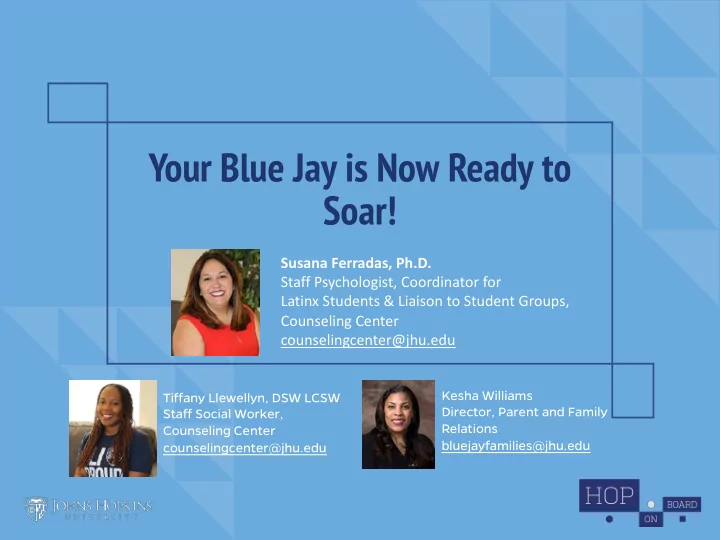

Your Blue Jay is Now Ready to Soar! Susana Ferradas, Ph.D. Staff Psychologist, Coordinator for Latinx Students & Liaison to Student Groups, Counseling Center counselingcenter@jhu.edu Kesha Williams Tiffany Llewellyn, DSW LCSW Director, Parent and Family Staff Social Worker, Relations Counseling Center bluejayfamilies@jhu.edu counselingcenter@jhu.edu
Program Overview I. Introductions II. College Student Development III. Common Stressors for First Year Students IV. Family Involvement in College Student Development V. Effective Parenting Strategies VI. Resources VII. Q & A
College Student Development • From the ages of 18-25, emerging adulthood, college students are building their identity (Brewer, Nicotera, Veeh, & Laser-Maira, 2018) • risks and build This is an opportunity for them to take ri their se efficacy . In order to do that they need to have self-ef more aut nomy . autono • setbacks are a normal part of emerging nges and se Chal Challeng adulthood and the college transition
Common Stressors • Academic • Managing multiple deadlines and assignments • Imposter syndrome – Do I belong here? • Social • Maintaining balance between academic life and social life • Establishing social connections • COVID-19 Related Stress
Family Involvement in College Student Development • Parental involvement is important in development of social, emotional, and cognitive adjustment (Darlow, Norvilities, & Schuetze, 2017). • Overparenting can make students feel less competent and more vulnerable to stressors. • Supportive parenting improves overall well-being and self- efficacy.
Effective Parenting Strategies • Utilizing Active Listening • Setting firm/clear expectations • Encouraging Problem Solving • What are your options? • What resources are available? • Are there any faculty, staff, or peers you can reach out to for support?
Effective Parenting Strategies • Modeling/Encouraging healthy behaviors • Establishing a regular, structured schedule including breaks and exercise • Connecting with nature (American Psychological Association. (2020, April). Nurtured by nature. Monitor on Psychology , 51 (3). • Creating a designated workspace • Implementing a regular sleep/wake schedule
Resources • Professors and Teaching Assistants • Academic Advisors • First Year Mentors • Calm app ht https://www.calm.com/jhu hu • Silver Cloud ht https://jhu hu.silver ercloudhea health. h.com/signu nup/
Resources • TimelyMD ht https ps://www.timely.md/faq aq/ment ntal al-teleh telehea ealth lth-fa faq/ • us use s service k key “ “JHU2020” • JHU Wellness website www.we www.wellness.j .jhu.e .edu du • A Place to Talk –Z – Peer Listening Service • Zoom room is open Tuesdays & Thursdays 9 - 11 pm EST and Wednesdays 11 am - 1 pm EST. • Counseling Center ht https://s //student ntaffairs.jhu hu.edu/c /couns nseling ngcent nter/
Questions? Thank You!
Recommend
More recommend